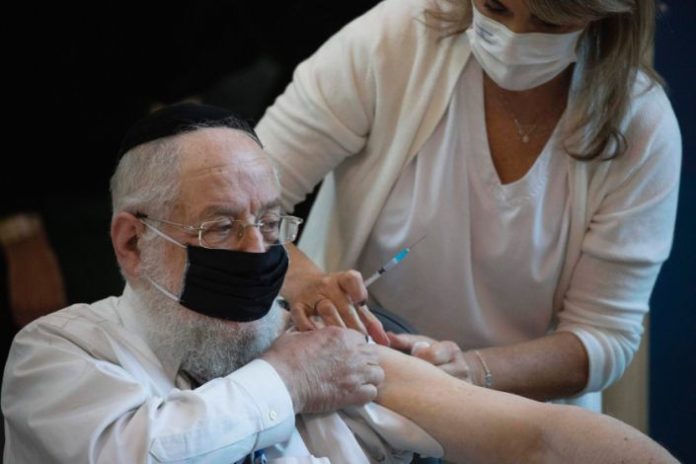More young Israelis are being hospitalized for COVID-19 than older ones, according to new data – suggesting that Israel’s vaccination campaign may be having an effect.
As of Wednesday, the number of Israelis under the age of 60 who were newly hospitalized for COVID-19 has surpassed the number of new hospitalizations among those 60 and up.
There were 708 new hospitalizations among the younger group and 575 for the older group. The change first occurred on February 4 and the gap appears to be widening since.
The figure represents the total of new hospitalizations for the preceding week. There are 1,598 Israelis in hospitals — more than the sum of new hospitalizations, because many patients remain in the hospital for over a week.
Israel mainly uses the Pfizer-BioNTech shot, which requires two doses several weeks apart for its full effect, but even appears to start to provide some protection days after receiving the first dose.
As of February 6, the most recent day the data was available by age group, 90% of Israelis over 60 had received their first vaccine dose, and 80% had received their second dose.
For 16- to 59-year-olds, 37% had received their first dose and 20% the second. The vaccine is available to all Israelis age 16 and older.
Forty-two percent of the general population has received one dose of the vaccine and 27% both doses. Israel has vaccinated a total of 3.7 million people with the first shot, and 2.3 million with both shots.
Our World in Data, a science website based at Oxford University, collated the data from Israel with the help of Israeli researchers. It has focused on Israel to assess the impact of its world-leading vaccination campaign.
It noted that recent changes in infection rates, hospitalizations and deaths cannot be solely attributed to the impact of vaccination. For example, new virus variants and the national lockdown came into play around the same time as the vaccination campaign and also influence the data.
Eran Segal, a researcher at Israel’s Weizmann Institute, said Thursday that for those 60 and over, since the peak of the pandemic in mid-January there were 58% fewer cases, 44% fewer new hospitalizations and 40% fewer deaths.
Confirmed new cases for all Israelis are trending downward since mid-January, but for those under 60 the weekly average is still over 37,000 per week. The pandemic peaked in Israel on January 17 with an average of over 8,000 new cases per day.
Alarmingly, the number of hospitalizations for younger Israelis appears to be trending upward since mid-December, despite the vaccination campaign, which began December 19, and the nationwide lockdown, which started on January 8.
Also, the share of new cases among children and teenagers has been growing since late January, despite schools being closed.
Officials, including Prime Minister Benjamin Netanyahu, have blamed more contagious variants for the third-wave outbreak’s seeming imperviousness to the lockdown and vaccination campaign.
Total hospitalizations for those 60 and up, and for the population as a whole, has been on the decline since peaking in mid-January at close to 2,000 hospitalizations.
The number of new deaths has also been declining since late January, when it hit its highest rate since the start of the pandemic at 65 deaths on average per day.
The Ynet news site said Thursday that no hospital staff had achieved an inoculation rate of over 90%, including those who had recovered from the virus, according to Health Ministry figures. In some hospitals, under 60% of staff have received the first dose of the vaccine.
Nationwide, there have been 712,078 total infections and there are 67,796 active cases. The death toll is 5,266.
The vaccination rate has been leveling off in recent days, prompting officials to push for more younger Israelis to get the shots and to crack down on anti-vaccine commentary on social media.
(Times of Israel).






